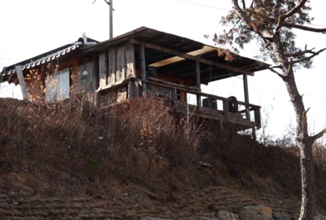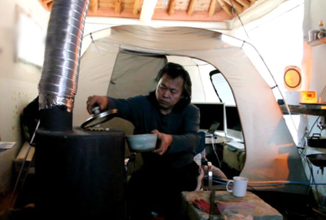"Death is just white becoming black."
Background:
Any discussion of the resurgence of Korean Cinema that began with an influx of new, younger filmmakers in the late 90's almost cannot fail to bring with it mention of Kim Ki-duk. A hugely influential and controversial director, a large number of his films have been released all over the world, in part because of their often 'extreme' content and subject matter and, in the West, DVDs of many of his films were originally released under the Tartan 'Asia Extreme' label specifically for that reason.
However, while this has resulted in a worldwide following and fanbase, the reaction of the Korean film industry, film critics, and even the general public in Korea has been less complimentary with accusations of misogyny, criticism of his depiction of women and even utter panning of his directorial style becoming almost commonplace over the years, to the extent that the director at one stage announced that he wouldn't release any more of his films in his home country.
Step forward to 2011, and Kim Ki-duk has been conspicuous by his absence in the film industry for almost three years, largely refusing to give interviews or even appear in public at film events and screenings, leading many to ask if he was regrouping; simply preparing for his next project; or if he had, in fact, turned his back on filmmaking once and for all.
Review:
It is at this point in time that we join Arirang to find a long-haired and rather unkempt Kim Ki-duk living an utterly isolated existence in a run-down cabin deep in the countryside, with no central heating (the inside of his home being so cold that he has to sleep in a tent in the main room to keep warm), no running water, no inside toilet and only his cat and the thoughts in his head for company. And what thoughts they are...
The first fifteen minutes of Arirang bring us face-to-face with the director's current day-to-day life at the time of filming, and I use the word 'life' in its loosest possible context here as 'existence' would be far more accurate - his waking hours being filled with little more than cooking food, cutting fire to burn, digging a hole in the ground to use as a toilet and staring into the distance from his doorway. There is almost no dialogue in this section of the film save for Kim Ki-duk talking to, and imitating, his cat, and as such we are left in no doubt whatsoever as to how utterly cut off from the outside world his self-imposed exile truly is.
Though Arirang is largely a documentary, there are elements of fictional drama present even at this early stage with Kim Ki-duk being plagued by sounds of knocking on his front door each time he goes to bed in his tent but finding no-one there when he gets up and goes to check - his subconscious guilt, regret and bitterness knocking on the door of his conscious mind, if you will.
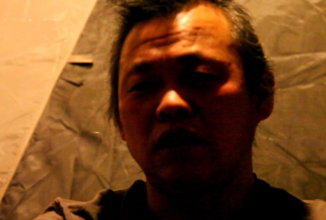 |
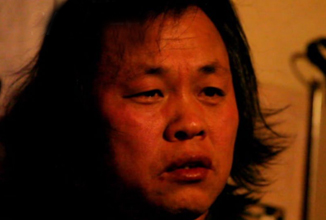 |
From here, the film switches to a Kim Ki-duk interview with himself - the director playing the part of interviewer (both as an inquisitor, with his hair tied back, and as Kim Ki-duk's shadow), interviewee and viewer watching the finished film, and it is at this point in proceedings that Arirang really takes off as the film gradually strips away his surface persona to reveal the broken man beneath.
While this ongoing interview is filmed as a series of monologues between the 'characters', filmed from two angles on a single static digital camera and intercut to form a back and forth question and answer session it, at the same time, feels like the visual switching between a character's various psychological frames of mind seen in so many films from across the world (used to visually depict a fractured mind), and as such, Kim Ki-duk's conversation - jumping from justification of his past decisions and work; to regret relating to an on-set accident during the making of Dream which almost resulted in the death of the lead actress by hanging; to feelings of betrayal, venomous spewing of expletive-laden vitriol and a growing desire for revenge - cannot fail to bring viewers to the realisation that they are looking at a man on the very edge of falling apart.
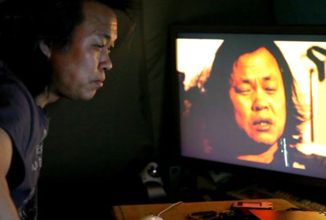 |
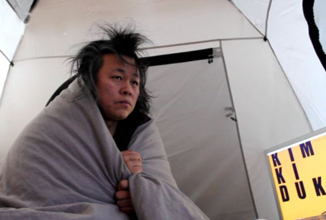 |
And fall apart he does, while singing an acapella version of the song Arirang - Korea's unofficial anthem that has clearly become something of a mantra for Kim Ki-duk. Though he later brings the truth of these floods of tears into question by asking viewers to judge whether they were real or, in fact, just an example of his acting skill, they are so clearly genuine as to leave little doubt that his later comments are simply a smokescreen intended to hide the fact that we've just witnessed his heart truly breaking, and understandable though his protestations are, nothing can detract from the utter poignancy of that deeply moving scene.
Following the interview, towards the film's conclusion, Kim Ki-duk steps fully into fictional drama mode and we watch as he slowly loads a homemade silver gun and heads out to the city in his car... but any further comment would risk destroying the sheer power of those final scenes.
It could, of course, be said that Kim Ki-duk's decision to make Arirang was as egotistical and self-obsessed as it was a search for catharsis but it deftly serves its purpose regardless of which you believe, and it does have to be said that three years spent living the way he was - the only voices heard being those in his head - could ever so easily have pushed him right past egotism and into madness, save for his desperate need to make a film... this film.
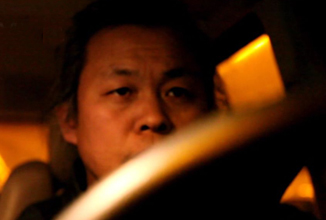 |
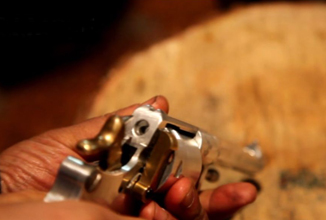 |
Summary:
Arirang is a deeply personal search for catharsis from a director frozen by how he feels he's been treated by the film industry and, regardless of whether or not you are a fan of his work, it stands as an utterly unmissable example of his talent. To my mind, Arirang is quite simply Kim Ki-duk's best film to date.
This review of Arirang was possible as the result of a screener being provided courtesy of Terracotta Distribution. The company has acquired the UK distribution rights of the film which will have it's UK premiere on April 14th 2012 at the Terracotta Far East Film Festival (http://terracottafestival.com/) and will be released nationwide in cinemas on June 8th.
A UK DVD of the film will also subsequently be released by Terracotta Distribution, the full details of which will be added to this review as soon as they are available.
|


